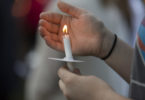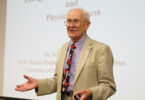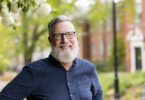Richard Powers, whose powerful novels have led critics to proclaim him one of the most important writers now working in the United States, will deliver the spring Charter Lecture March 29, beginning at 3 p.m. in Masters Hall of the Georgia Center for Continuing Education.
The event is open free to the public.
Powers is frequently called one of the best novelists of his generation. The New York Times called the most recent of his eight novels “astonishing, prodigious, illuminating and exhilarating.” Richard Eder, writing in The Los Angeles Times, said, “Powers is a writer of blistering intellect; he has only to think about a subject and the paint curls off. He is a novelist of ideas and a novelist of witness, and in both respects he has few American peers.”
Powers is also a winner of a prestigious MacArthur Fellowship, often called the “genius award.”
He will be delivering the lecture in honor of the late Hugh Kenner, one of America’s most honored literary critics and a faculty member in UGA’s English department for the last nine years of his career. Powers says that Kenner’s book The Pound Era changed his life and made him want to become a writer. Kenner died Nov. 24, 2003.
Powers, a professor of English at the University of Illinois at Champaign-Urbana, holds the Swanlund Endowed Chair and is also on the faculty of the university’s Center for Advanced Study.
“We are most delighted that Powers is coming to the University of Georgia to celebrate another polymath, Hugh Kenner,” says Nelson Hilton, head of the UGA department of English. “Those wishing to encounter in person one of our best and widest-ranging writers should not miss this presentation. Think Melville, 1855, or Joyce, 1930-with the addition of multimedia.”
Powers’s first two novels, Three Farmers on Their Way to a Dance and Prisoner’s Dilemma, were extremely well received, but his third novel, the intricate and beautifully dense The Gold Bug Variations, put him on the international literary map. This novel, a love story wound around the early years of molecular genetics and the discovery of DNA’s coding and operation, was hailed by critics in numerous journals and newspapers as one of the best novels ever written about science.
His subsequent works include the novels Operation Wandering Soul, Galatea 2.2, Gain, Plowing the Dark and The Time of Our Singing. The last novel was honored from coast to coast and named a New York Times Notable Book of the Year for 2003.
A native of Evanston, Ill., Powers lived with his family for a time near Chicago and then spent five years in Bangkok as a teenager. He enrolled as a physics major at the University of Chicago in 1975, but a charismatic English professor changed the course of his life and steered him to literature, though Powers’s fascination with science and technology remains and permeates his work.
After completing bachelor’s and master’s degrees, Powers moved to Boston in 1980, where he worked as a computer programmer and freelance data processor, skills he had developed during his off hours at the University of Illinois.
After living for a time in the Netherlands, he returned to the University of Illinois in 1996 and continues to write, teach and travel. At Illinois, Powers teaches a graduate seminar in multimedia authoring and an undergraduate course in the mechanics of narrative, and he has undertaken stints at other universities as well.
He was elected a Fellow of the American Academy of Arts and Sciences in 1998. Powers became a MacArthur Fellow in 1989 and is the recipient of a Lannan Literary Award (1999). In that same year, he was named one of five Writers of the Decade by Esquire magazine. Other awards he has been given for the body of his work include the Corrington Award for Literary Excellence and the Dos Passos Prize for Literature.
The Charter Lecture series, established in 1988, honors the high ideals expressed in the 1785 document that founded the University of Georgia as the first chartered state university in the United States. A committee of senior faculty members selects speakers of the first rank for the series.






